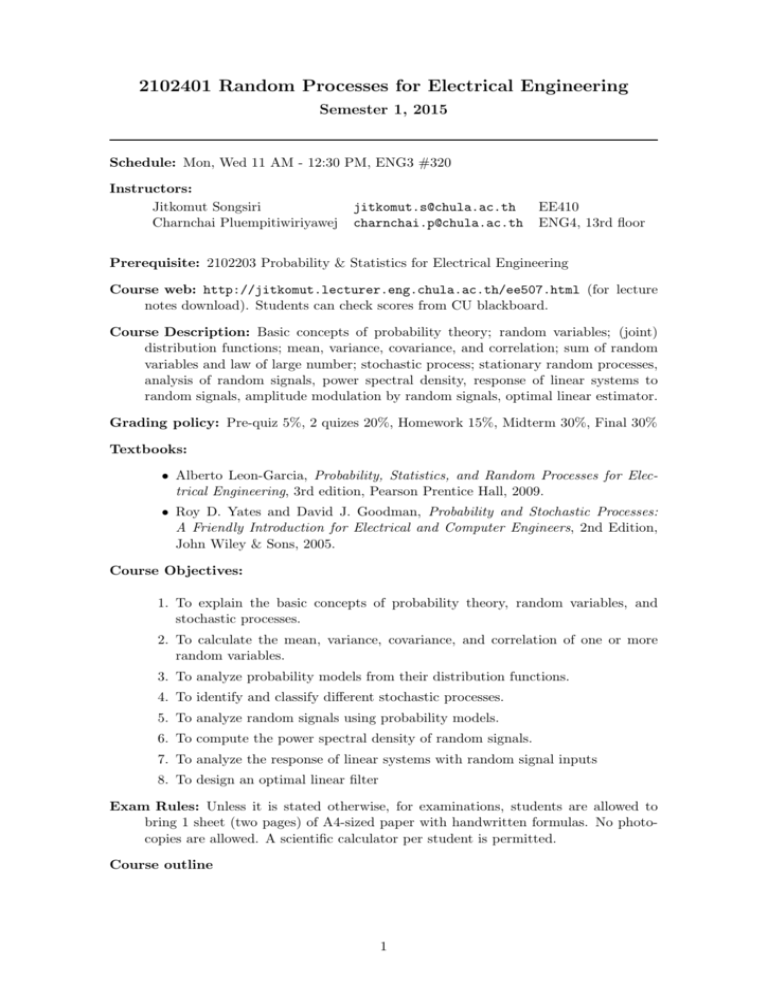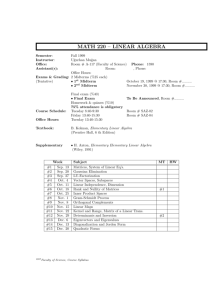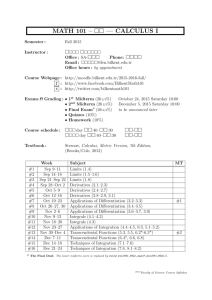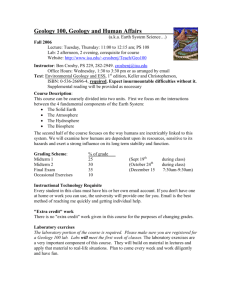
2102401 Random Processes for Electrical Engineering
Semester 1, 2015
Schedule: Mon, Wed 11 AM - 12:30 PM, ENG3 #320
Instructors:
Jitkomut Songsiri
Charnchai Pluempitiwiriyawej
jitkomut.s@chula.ac.th
charnchai.p@chula.ac.th
EE410
ENG4, 13rd floor
Prerequisite: 2102203 Probability & Statistics for Electrical Engineering
Course web: http://jitkomut.lecturer.eng.chula.ac.th/ee507.html (for lecture
notes download). Students can check scores from CU blackboard.
Course Description: Basic concepts of probability theory; random variables; (joint)
distribution functions; mean, variance, covariance, and correlation; sum of random
variables and law of large number; stochastic process; stationary random processes,
analysis of random signals, power spectral density, response of linear systems to
random signals, amplitude modulation by random signals, optimal linear estimator.
Grading policy: Pre-quiz 5%, 2 quizes 20%, Homework 15%, Midterm 30%, Final 30%
Textbooks:
• Alberto Leon-Garcia, Probability, Statistics, and Random Processes for Electrical Engineering, 3rd edition, Pearson Prentice Hall, 2009.
• Roy D. Yates and David J. Goodman, Probability and Stochastic Processes:
A Friendly Introduction for Electrical and Computer Engineers, 2nd Edition,
John Wiley & Sons, 2005.
Course Objectives:
1. To explain the basic concepts of probability theory, random variables, and
stochastic processes.
2. To calculate the mean, variance, covariance, and correlation of one or more
random variables.
3. To analyze probability models from their distribution functions.
4. To identify and classify different stochastic processes.
5. To analyze random signals using probability models.
6. To compute the power spectral density of random signals.
7. To analyze the response of linear systems with random signal inputs
8. To design an optimal linear filter
Exam Rules: Unless it is stated otherwise, for examinations, students are allowed to
bring 1 sheet (two pages) of A4-sized paper with handwritten formulas. No photocopies are allowed. A scientific calculator per student is permitted.
Course outline
1
Week
1
2
3
4
5
6
7
8
9
10
11
12
13
14
15
16
17
Date
Aug 10
Aug 12
Aug 17
Aug 19
Aug 24
Aug 26
Aug 31
Sep 2
Sep 7
Sep 9
Sep 14
Sep 16
Sep 21
Sep 23
Oct 2
Oct 5
Oct 7
Oct 12
Oct 14
Oct 19
Oct 21
Oct 26
Oct 28
Nov 2
Nov 4
Nov 9
Nov 11
Nov 16
Nov 18
Nov 22
Nov 25
Dec 4
Outline
Review of Probability
No class (holiday)
Random Variables
Random Variables
Function of Random Variables
Functions of Random Variables
Pairs of Random Variables
Pairs of Random Variables
Multiple Random Variables
Multiple Random Variables
Multiple Random Variables
Multiple Random Variables
Sums of Random Variables
Sums of Random Variables
Midterm exam 1-4 PM
Random Processes
Random Processes
Specifying RPs
Specifying RPs
Stationary RPs
Stationary RPs
Continuity, Derivatives, and Integrals of RPs
Continuity, Derivatives, and Integrals of RPs
Power Spectral Density
Power Spectral Density
Response of Linear Systems to Random Signals
Response of Linear Systems to Random Signals
Optimal Linear Systems
Optimal Linear Systems
Reviews
Reviews
Final exam 1-4 PM
Homework
Pre-quiz
HW 1
Quiz 1
HW 2
HW 3
HW 4
HW 5
HW 6
Quiz 2
HW 7
HW 8
Class policies:
1. The lectures will be given mainly in English. Students should attempt to write
the homework in English as well.
2. Any student who is late more than 15 minutes will NOT be permitted to the
classroom and will be considered absent from the class unless he/she can provide
a reasonable explanation. Remember that when any student comes to class late,
it can interupt the flow of the lecture or distract other students.
3. Please refrain from using cellphones (include texting) and talking in class.
These activities obviously are distractions to the classroom. Cellphones should
be switched to the vibration mode.
4. Students must hand in homework at the begining of the class (11:00-11:15 AM)
on the due date, unless it is stated otherwise. Late homework is NOT accepted
in any case. You can always submit the HW before the deadline in Instructor’s
email or to his/her offices.
5. By default homework is an individual activity. Certainly you can form a study
group and share ideas with classmates but you MUST write up the solution
2
yourself independently. If a set of copied homework is detected, all involved
parties must withdraw from the class; otherwise you will receive an F. You can
declare a collaboration with classmates by writing all the collaborator names
on the work sheet.
6. There is NO make-up quizzes unless students have an acceptable reasons. Medical certificate is required if you miss the exam due to severe sickness. Having
a cold, nausea, or digestive problem is NOT considered as severe symptoms.
7. Students will receive an F if showing any intention of cheating during quiz,
midterm, or final exams.
8. Students must keep all graded homework and exam papers until the letter
grades are announced.
9. As a general rule, your grade is NOT negotiable, especially once the final exam
is over. Do NOT attempt to negotiate with the instructors because you will
definitely get NO for answer. Instead, if you feel you are behind the class, you
should come to office hours during the entire semester.
3







